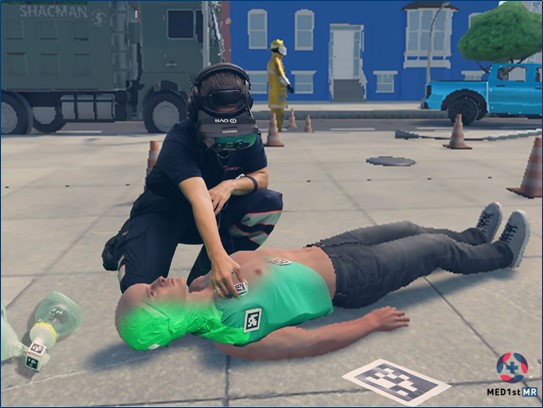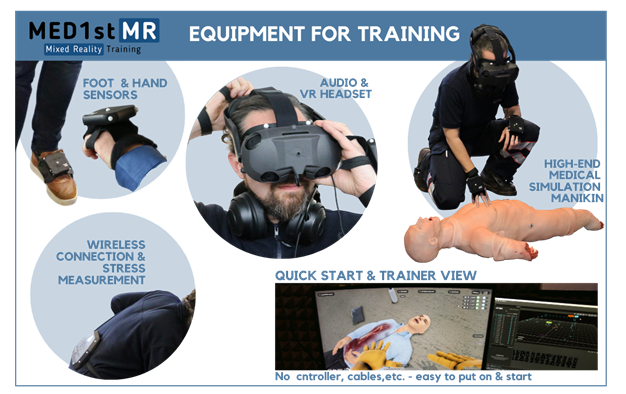AI-based mixed reality training solution promotes resilience.
The research and innovation H2020 project MED1stMR is transforming training for medical first responders. Innovative mixed reality technology is combined with patient simulation manikins, enhanced with stress measurement and an AI-based scenario control tool to better prepare the medical first responders for highly complex disaster situations in real life. Starting in July, the developed technology and the associated training program will be tested in training with end-users throughout Europe. In total, more than 200 rescue and emergency paramedics from all over Europe will train with the technology in 1-week training sessions at 6 locations and provide feedback to the research and development team.
The field trials are not public, but you can register for monitoring and as press and media observers: Please contact harthum@usceon.com or marlene.havel@johanniter.at
Challenging mass casualty incidents
Disasters with high numbers of injured persons (man-made or not) are on the rise. In such situations, medical first responders need to provide medical help, triage, and on-site management with communication and organisational tasks under extreme stress. The MED1stMR training solution supports them in preparing for such challenging events.
Technology journey
A multidisciplinary consortium with 18 partners from 9 European countries, coordinated by the AIT –Austrian Institute of Technology, Center for Technology Experience started in 2021 to create a realistic mixed reality training solution for medical first responders. “Product development across 9 European countries and 18 partner organisations is challenging, but end users are continuously involved in the development by the consortium to identify all relevant needs. This effectively bundles science, technology, and the perspective of medical first responders right from the start” says Helmut Schrom-Feiertag, AIT Vienna, coordinator of the project. After two years of requirement analysis with end users, technology development and preliminary scientific studies, the project is now ready for demonstration and evaluation in the field. The first training will take place in Vienna hosted by Johanniter Austria, who are contributing to the project primarily with its expertise from the perspective of rescue services and disaster relief. Johanniter Austria is responsible for the execution of the first training week in the project but is also involved in the development of the training solution from the beginning – Together with 5 other European emergency response organisations, they contribute their expertise in order to better manage the needs of future users in the development phase.
Dr. Daniela Weismeier-Sammer, who has been involved in the MED1stMR project with her knowledge from being an active rescue and emergency paramedic as well as a researcher at Johanniter Österreich Ausbildung und Forschung gemeinnützige GmbH, says: “It is great to have been involved in the development of MED1stMR from the very beginning. We can use the MED1stMR training system to train large, complex emergency scenarios and prepare ourselves optimally. The biggest advantages of mixed reality training for us are the ability to repeat each training as many times as we want and, of course, the post-training analysis capability for debriefing and analysis.”
Technology Experience
The large-scale scenario simulation training (see: www.med1stmr.eu/field-trials) will provide insights into the suitability of the mixed reality training solution. A team of experienced trainers from the project will train the local trainers according to the “train the trainer” principle to pass on the knowledge and ensure the application of the training methods. Up to four trainees per group will train two different major incident scenarios each, using the advanced MED1stMR technology.
Field Trial Purpose:
- Evaluate the developed technology under realistic conditions (1-week training with 3-5 training sessions per day)
- Receive feedback from the end users on quality of experience and technology acceptance for further development (all trainees are active medical first responders in their countries)
- Research studies on site (stress, performance, cognitive state, team behaviour etc.)
- Raise awareness for the topic of virtual training using a mixed reality environment for medical first responders to better prepare for disaster situations (involvement of decision- and policymakers)
Learning effects
Virtual reality has proven to be suitable to train complex situations to improve learning. But MED1stMR goes even further than just providing different environments and virtual patients. To increase the realism of virtual simulated training, the solution includes medical high-end patient simulation manikins for an enhanced sensory experience and haptic feedback (like feeling a pulse). This allows trainees to immerse in virtual scenarios and tactilely feel and visually perceive body, limbs and movements while examining and treating patients.
Stress measurement & resilience training
Furthermore, biosignals data of the trainees are measured during training. This data is analysed and interpreted as individual stress level in a strong backend to be displayed together with numerous other information to the observing trainer in a user-friendly dashboard. This dashboard provides the trainer with the virtual scenario flow, the decisions of the trainees, and their performance data. Based on this evidence, the trainer can change the scenario on the fly to provide the best learning results for the trainees. To support trainers and optimise outcomes, the scenario can also be controlled automatically based on artificial intelligence (based on biosignals and behavioral data).
This new generation of learning enables evidence-based decisions for trainers and realistic learning experiences for medical first responders. The MED1stMR training solution will increase action confidence, enable faster responses, and improve coping strategies for medical first responders. Technical solutions that go beyond the current state of the art and are supported by scientific research will have an important impact on the efficiency of future training. In conclusion, Benjamin Schuster (Johanniter Austria), who contributes his research and technology experience as well as his knowledge as a rescue and emergency paramedic to the project, says: “We see the MED1stMR project and the mixed reality technology as an option to better prepare emergency workers for medical emergencies. The cooperation within the project with other European emergency response organizations and the scientific and technical project partners is a very valuable aspect for us.”
Project information:
- EU Horizon 2020 Program, Funding: 7.8 Mio, No.: 101021775, Duration: 36 months
- Press photos: https://www.med1stmr.eu/press-material/
- Website: www.med1stmr.eu
- Video: https://www.youtube.com/watch?v=TlC_E2jtTz8
- LinkedIn: https://www.linkedin.com/company/med1stmr
- Twitter: https://twitter.com/Med1stmr
- Project partner: https://www.med1stmr.eu/consortium/
- Press contact:
Belinda Schneider Die Johanniter Österreich +43 676 83 112 813 | Christine Wahlmüller-Schiller AIT – Center for Technology Experience +43 664 88390690 | Birgit Harthum USECON – The Usability Consultants +43 664 8220252 |


